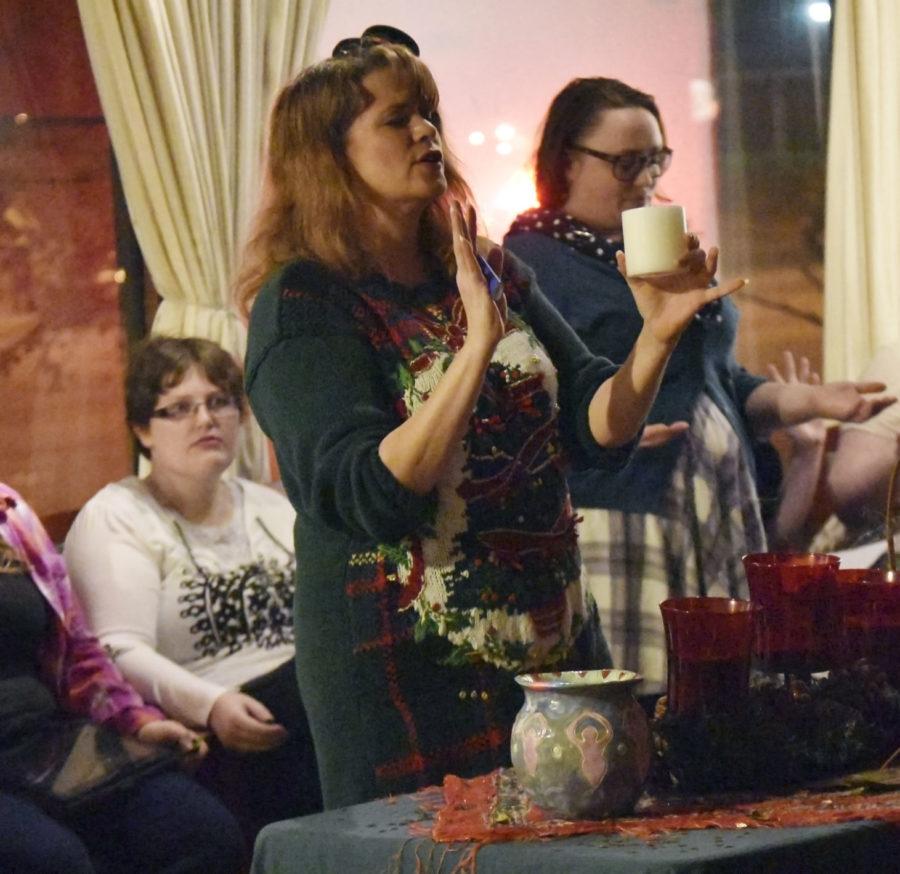Christmas originated from Pagan holiday
December 13, 2015
Christmas may be the most popular and commercialized holiday today, but it has roots in a religion other than Christianity.
Yule, a Pagan winter solstice holiday, has some of the same traditions and rituals.
“There’s a lot of traditions that were stolen or changed,” said Tara Nelsen, SIUC alumna and founder of the Southern Illinois Pagan Alliance, from Murphysboro.
Advertisement
Decorating trees, singing carols and exchanging gifts are just a few of the traditions Christmas has adopted from the pagan holiday, according to History Today.
The Southern Illinois Pagan Alliance is a community group founded in 1998 with the purpose of celebrating and educating the public about pagan spirituality. Paganism is any type of earth-based spiritual religion that is usually both pantheistic and polytheistic, Nelsen said.
Nelsen has practiced as an eclectic pagan for more than 25 years and said she doesn’t identify with one set of religious practices, but rather believes in a variety.
The Southern Illinois Pagan Alliance hosted its annual Yule celebration at the Gaia House on Saturday night, where many types of pagans of all ages gathered together to sing carols, light the Yule fire, burn holly leaves and share in a spiritual experience. After the rituals, they ate together and exchanged gifts.
“Most pagan traditions follow the cycle of nature and the changing of the seasons,” Nelsen said. “So, all of our sabbats relate somehow to what’s going on in nature.”
Historically, Yule is the time for people to come together during the longest night of the year to stay warm, feast and look forward to lighter and warmer days while honoring the cycle of nature, she said.
“Earth-based spiritual traditions have been around long before Christianity was created. A lot of the basic concepts and symbols that you see around Christmas have pagan roots,” she said.
Advertisement*
This is because the celebration of Christmas as a specific holiday was established by a pagan Roman Emperor more than 1,700 years ago, according to Dan Owen, the evangelist at the Broadway Church of Christ in Paducah, Ky.
Owen has a bachelor’s degree in Bible and Biblical Languages, a master’s degree in Greek New Testament and a doctorate from SIUC in Education of Ministers.
Although the Bible says nothing about the celebration of Christmas, it is never wrong to preach and talk about the birth of Christ, he said, including on Dec. 25, because it’s part of the Gospel.
The birth of Christmas begins with the birth of Christ, which is recorded in the New Testament in the books of Matthew and Luke, and then with the birth of Christianity itself on the day of Pentecost in the book of Acts.
Christianity was first legalized in 313 A.D. when Constantine became the emperor and passed the Edict of Milan, Owen said. Although Constantine wasn’t a Christian, he was sympathetic towards Christians.
“This was the first time that people could actually conduct worship without being persecuted,” he said.
Since Constantine established a work holiday at the winter solstice in honor of the birth of a pagan sun god, Sol Invictus, he also gave the Christians a holiday to celebrate the birth of their God, Jesus Christ, Owen said.
“And, that was the beginning of the celebration of a day for the birth of Christ,” he said.
Christian churches gradually took that up as a special holiday, and it became a special high mass in Roman Catholicism called Christ Mass or Christmas.
The traditions and rituals that are known today as belonging to Christmas were actually adopted from the Roman winter solstice holiday in 313 A.D., which is why the celebration of Yule and Christmas are so similar, he said.
Nelsen doesn’t mind that pagan traditions were stolen or changed, though, because she said she believes everyone should be able to practice their religions however they want.
Khara Lukancic, a graduate student in geography from Harrisburg, has been practicing Norse paganism for 18 years and joined the Southern Illinois Pagan Alliance more than a year ago.
Lukancic said it doesn’t matter where the traditions came from or whether the traditions were changed, as long as it allows more people to celebrate in communities together.
“I think there’s room for everybody,” she said. “I think it’s a matter of your intention and just enjoying the people around you.”
Autumn Douglas can be reached at 618-536-3325 or [email protected]
Advertisement








